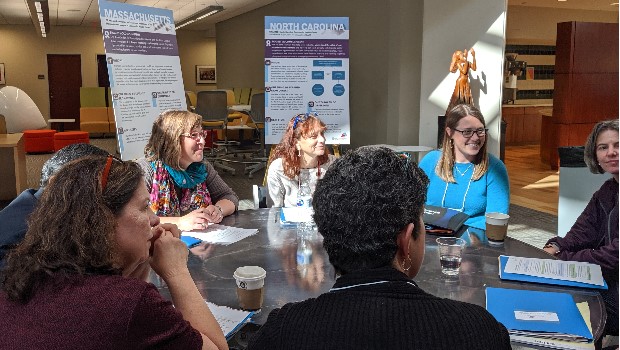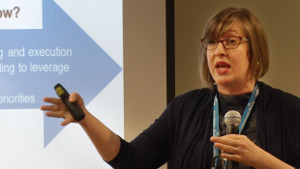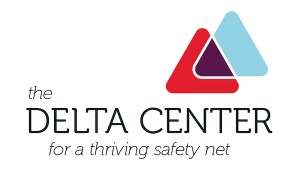Delta Center announces funding for 8 more states

MacColl Center Director Katie Coleman (2nd from left, back row) meets with colleagues at a Delta Center event.
KPWHRI’s MacColl Center will continue as a partner in the effort to advance value-based payment and care in the safety net
SEATTLE - The Delta Center for a Thriving Safety Net recently announced three additional years of support from the Robert Wood Johnson Foundation to continue the initiative.
The Delta Center employs a novel approach to advancing policy and practice change by focusing on state and national associations representing thousands of safety-net providers across the nation. The effort is led by JSI Research & Training Institute, Inc. (JSI) in partnership with the MacColl Center for Health Care Innovation at Kaiser Permanente Washington Health Research Institute, the National Association of Community Health Centers (NACHC), and the National Council for Behavioral Health (National Council) as strategic partners.
The project brings together state primary care associations (PCAs) and behavioral health state associations (BHSAs) to build relationships and take collective action to advance policy, payment, and practice changes that will benefit millions of people served by health centers and community behavioral health organizations.
The ultimate goal is to cultivate health policy and a care system that is more equitable and better meets the needs of individuals and families. In the first 3 years of the project, the Delta Center awarded grants to 12 state teams to advance policy and care change in their states. Teams participated in six convenings, virtual learning opportunities, and a site visit as well as receiving monthly coaching. During this time, the MacColl Center has been a key partner, spearheading the practice change component of the Delta Center, coaching states 1:1, and leading the development of the in-person learning sessions.
Now, in the project’s second phase, Families USA will be joining as a partner to advise the Delta Center on how best to elevate meeting individual and family needs as a guiding principle for all project activities. The second phase will fund 8 states from the original cohort of grantees to build on their collaborative work and will expand the initiative’s reach to 8 additional states, increasing the Delta Center’s impact in advancing payment, policy, and practice change that ultimately improves lives.
“I’m thrilled for the opportunity to have three more years to advance the work of the Delta Center,” said Katie Coleman, MSPH, director of the MacColl Center. “Now more than ever, we need our efforts to be focused on the needs of real people facing real crises. Partnering with Families USA will help us elevate that work as we expand our support to eight additional states.”
Through its work to date, the Delta Center has strengthened national partnership and thought leadership on value-based payment and care (VBP/C); fostered alignment in behavioral health and primary care VBP/C strategy in 12 states; increased capacity of associations to support their providers in VBP/C; and catalyzed major state policy actions to improve access and care.
Rachel Tobey, Co-Director of the Delta Center noted: “Delta Center grantees have demonstrated the power of partnership with their actions. Grantees have elevated the benefits of telehealth or primary care and behavioral health in Medicaid in New York, made critical strides toward behavioral health payment parity in New Mexico, and created a joint training center and co-located offices to facilitate ongoing collaboration in Missouri. These are just a few examples of how primary care associations and behavioral health state associations are ensuring that the policy and care systems in their states are best positioned to improve care and ultimately health for patients and consumers. The recent pandemic has only emphasized how important it is to have a strong primary care and behavioral health safety net in this country.”
Since the Delta Center launched in 2018, the imperative for PCAs and BHSAs to collaborate in achieving greater financial flexibility and stability for the safety net has only increased. The COVID-19 pandemic has dramatically increased the number of people who rely on Medicaid, at the same time as safety-net provider organizations contend with service cuts or even closure. In response, states and the Center for Medicare and Medicaid Services (CMS) have enacted rapid policy reforms to facilitate care during the pandemic. Providers and the individuals and families they serve will need continued support through this crisis and beyond.
One grantee explained: “Without this grant I don’t think that conversation would be as likely—the dialogue and communication between us is far better than it’s ever been. I feel comfortable to ask them [counterpart association] anything. In thinking about the future, and future crises like this, it opens my mind to what’s possible with community partners that we often didn’t think about.”
The Delta Center released a Call for Proposals (CFP) for new states to join the collaborative on October 29. The CFP invites teams made up of PCAs and BHSAs to apply for a 27-month, $240,000 grant to complete a project that advances policy and/or practice change in their state, and to participate in a learning community of eight PCA/BHSA grantee teams from a diverse set of states. State teams selected will be in states that have not yet participated in the Delta Center, and will also have the opportunity to interact and learn from the state PCA/BHSA grantees from Phase 1 of the initiative. The Delta Center will hold an optional informational webinar on November 17, and proposals are due in mid-January 2021.
“We are excited for this next phase of the Delta Center’s work, especially the efforts of state associations to focus more closely on what patients say they most want and need from their health care,” said Andrea Ducas, senior program officer at the Robert Wood Johnson Foundation. “This type of work is necessary to bring about practice change that is meaningful for patients and their families.”
Read more about the initiative and partners.
The above story was adapted from copy provided by John Snow, Inc. and updated on October 29 to include information about the Call for Proposals.
ACT Center

New center focuses on equitable, whole-person health care
Kaiser Permanente launches the Center for Accelerating Care Transformation.
grants

Delta Center awards $2.4 million to 10 state associations
New collaborative with John Snow Inc. and Center for Care Innovations aims to spur innovation in value-based payment and care.
news

MacColl Center helps launch Delta Center
New collaborative with John Snow Inc. and Center for Care Innovations aims to spur innovation in value-based payment and care.
Leadership
Primary care improvement expert to lead MacColl Center
New director brings deep expertise from innovative work with community health centers and national networks.


